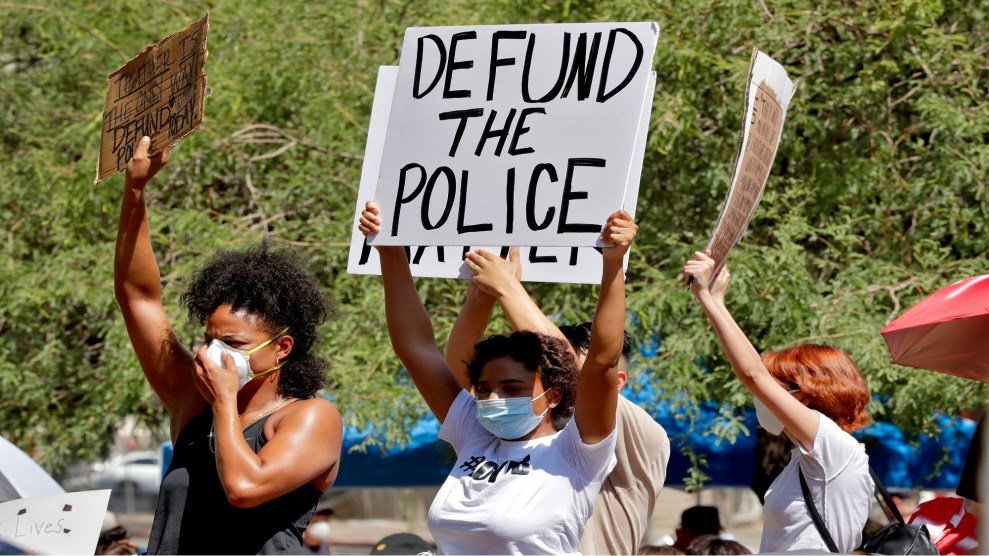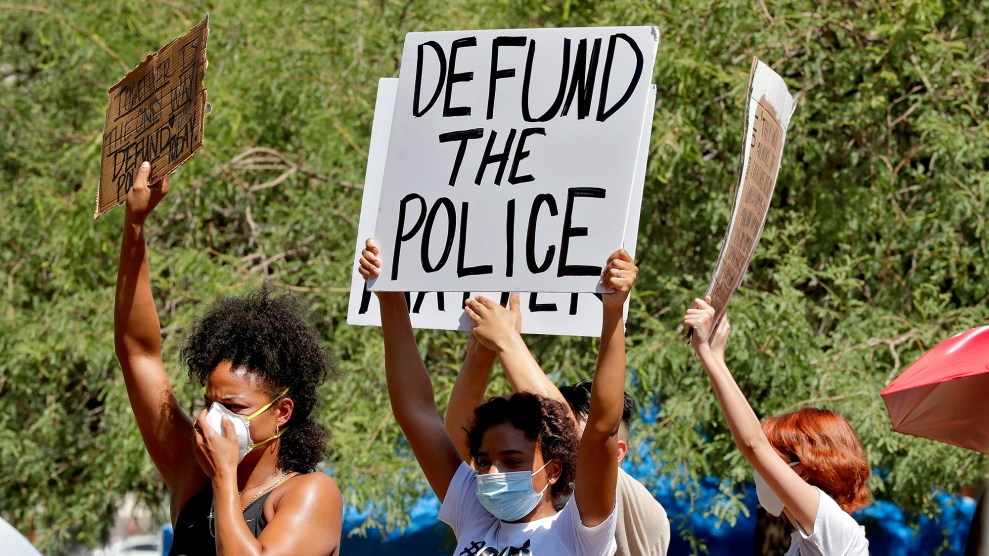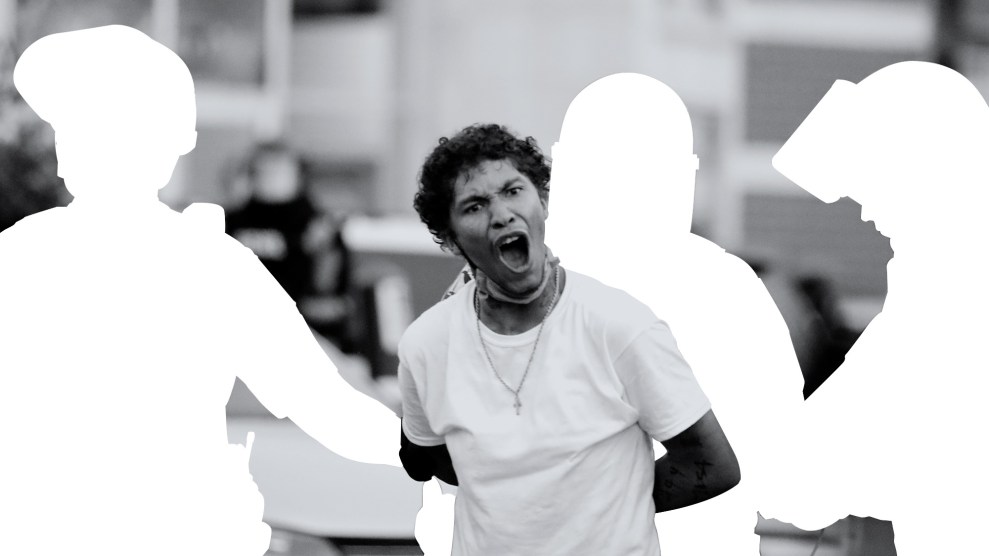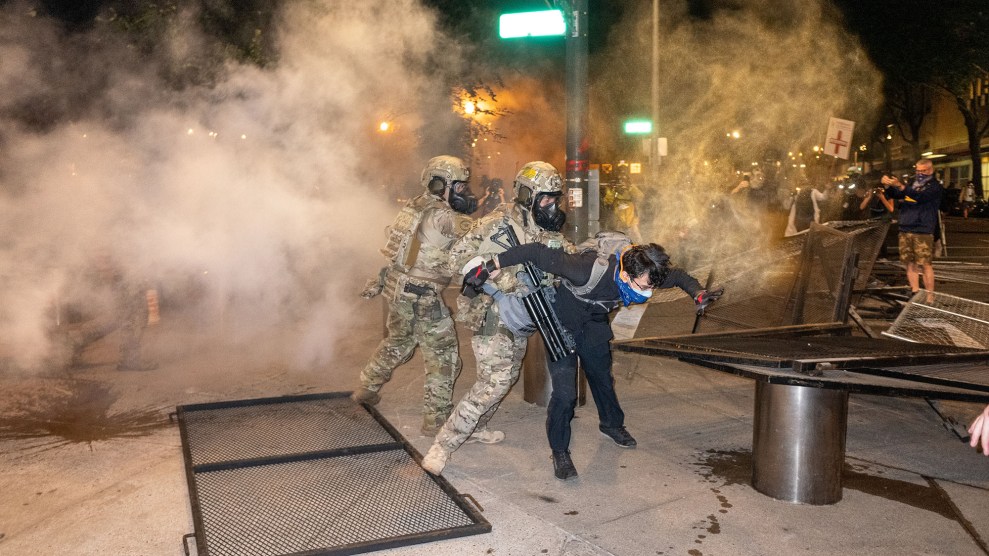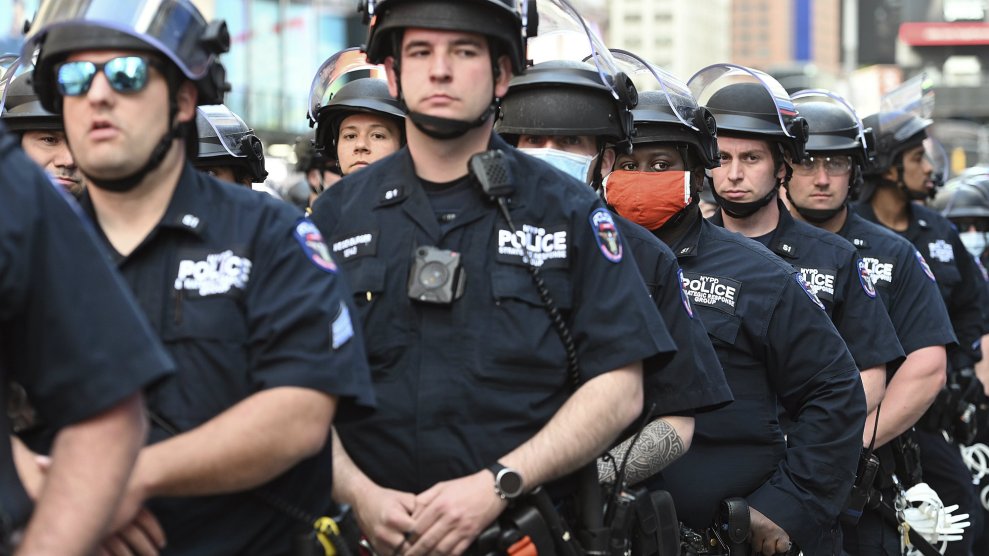
Anthony Behar/AP
Black feminists have led the movement on defunding and eventually abolishing the police, and gradually the idea has gained momentum across the country. Since the killing of George Floyd at the hands of the Minneapolis Police Department on Memorial Day, people in the United States have witnessed a constant stream of images depicting the kind of police violence Black and brown communities have known existed for centuries. Those images have spurred demands for police reform, and then for defunding and disbanding police departments.
In recent polls, 59 percent of respondents support major police reform. But when the questions concern defunding the police, a Morning Consult poll showed only 28 percent of voters were in favor. As they weighed in on the conversation concerning what to do about the current state of American policing, pundits have taken great pains to explain that defunding the police is not popular, so it’s not a worthwhile movement.
Lots of support for various reforms that would save lives and improve America.
But “defunding the police” is underwater 29-49 among African-Americans (26-60 with whites). https://t.co/FUya4A8Lgt pic.twitter.com/a4GENmuJir
— Matthew Yglesias (@mattyglesias) June 12, 2020
Don’t do this. It will wreck the chance to pass meaningful reform. https://t.co/Ya4zma0pwL
— Andrew Sullivan (@sullydish) June 7, 2020
In the wake of the killing of George Floyd, a majority of Americans support changing the way policing is done in the United States. But remember, police departments across the country have already implemented a lot of the reforms that are being touted right now like body cameras, or more Black and brown officers, or increasing de-escalation training. States and municipalities have added body cameras, police departments have ramped up hiring of Black and brown officers, and the cop who shot and killed Rayshard Brooks in Atlanta, had just completed a nine hour de-escalation course in April.
Still, reform rather than defunding is still the way the majority of Americans want to go. Take the Morning Consult poll I mentioned earlier. Yes, only 28 percent of voters were in favor of defunding the police, but when broken down by race, the picture changes radically. Only 25 percent of white voters support defunding the police, while 50 percent of Black voters back the movement. Historically, Black people’s views of civil rights struggles have differed sharply from their white counterparts.
The rush to dismiss defunding the police because it’s a polling failure reveals that we haven’t learned much from our own history. Those who consider defund the police activists as too extreme and undermining their own movement, sound eerily similar to those who dismissed civil rights activists in the 1960s. Despite the whitewashed history repeated in schools, most white Americans did not support the movement at the time. “Time passes and people can start to intentionally or not rewrite history, particularly around something that seems as amorphous as public opinion,” Kathleen Weldon, the director of data operations and communications at the Roper Center for Public Opinion Research told the Washington Post in 2016.
Much like police reform, the Civil Rights Act, the sweeping bill signed by Lyndon B. Johnson in 1964 enjoyed broad popular support at 58 percent and a 1965 Gallup poll found that 76 percent of Americans approved of the proposed Voting Rights Act of 1966. But after the 1964 act became law, 68 percent wanted only “moderate” enforcement of its mandates. In fact, 42 percent thought the government was moving too fast to bestow voting rights and the right to be served in public places to Black people.
Rev. Martin Luther King, Jr. who is now honored as a Civil Rights icon even by people who continue to deny Black people their voting rights, was deeply unpopular before he was shot and killed. In 1966, the last year Gallup measured America’s perception of King, 63 percent had a negative view. But by 1983, the United States honored him with a federal holiday. (And even then, many legislators opposed the posthumous honor.) Today, MLK has been weaponized by white people who use his name to silence Black protesters. “I think [King would] be appalled by the notion that we’re elevating some lives above others,” Mike Huckabee, former Republican governor of Arkansas and twice failed presidential candidate said about Black Lives Matter protesters in 2015.
Not that long ago, interracial marriage was a fringe idea with dismal polling numbers as well. In 1967, when the Supreme Court decided to legalize interracial marriage in Loving v. Virginia, 19 states had laws criminalizing marrying someone of a different race. Forty-eight percent of Americans approved of such laws. And in 1968, when asked about their personal feelings, 72 percent of Americans said they personally disapproved of interracial marriage. Approval for interracial marriage did not cross the 50 percent threshold until the 1990s.
History shows us that positions that once seemed radical, often become the norm. But only if we shed this idea that whiteness is the neutral observer and the ultimate arbiter. If police violence affects your everyday life and your surrounding community, polling statistics become a cudgel. Racial violence may be destroying our communities and our confidence in this country, but how can we entertain a notion of radical reform if white people don’t approve? When you say it’s not a popular slogan, or suburban women don’t like it, or the polls in support are simply not high, you’re signaling to marginalized communities that while Black people are dying in the streets, you’d rather repeat history than learn from it.


